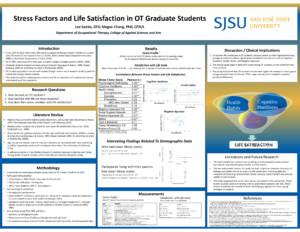As part of my master’s in occupational therapy at San Jose State University, I authored a research project with my research professor. The project was to have my fellow OT students take some questionnaires about how stressed they were and how satisfied they were with their lives. I then crunched the numbers and got some interesting results!

Here is the research project I completed for my occupational therapy master’s degree:
Research Project: The Relationship Between Stress and Life Satisfaction Among Occupational Therapy Graduate Students
I’m honored to have been selected to present my research as a poster presentation at the 2016 OTAC (Occupational Therapy Association of California) conference in Pasadena, California.
Poster Presentation: The Relationship Between Stress and Life Satisfaction Among Occupational Therapy Graduate Students
Highlights:
The OT students surveyed had average stress levels (surprising for grad school!) and high life satisfaction (also surprising for grad school!). And they felt like they got the support they needed from friends and family. Read on for more deets.
72 SJSU occupational therapy students completed two self-report questionnaires: The Stress Profile and the Satisfaction with Life Scale. The Stress Profile measures 15 areas related to stress and health risk. The Satisfaction with Life Scale measures a person’s global cognitive judgment of satisfaction with their life. The results were analyzed, looking for correlations and other relationships.
Results:
On average, participants in the study:
– had typical stress levels
– had a high life satisfaction score
– had a high level of social support (a belief that they have people in their lives on a regular basis who love and support them)
– that were living with their parents had significantly lower stress scores
– that were living with their parents reported less use of alcohol, recreational drugs and cigarettes
– that were male had significantly lower stress scores than women
The people surveyed that were most satisfied with their lives had 3 things in common, they had a good outlook on life, felt like they ate well, and didn’t think poorly of themselves. Now read that same info in master’s project-ese:
The strongest correlations between life satisfaction and individual stress factor scales were:
– High Cognitive Hardiness
– High Health Habits (especially, eating/nutrition, and exercise)
– Low Negative Appraisal
Brief definitions of those terms:
Cognitive Hardiness: a coping style… a buffer between work and stress. It has 3 attributes:
1) View of commitment rather than alienation in work and life
2) Personal control over one’s life
3) View of life change as a challenge rather than a threat
Eating/Nutrition: Whether a person practices eating what they believe to be well balanced and nourishing meals.
Negative Appraisal: Approaching life’s challenges with a negative attitude, using self-blame and criticism.
Limitations: There are lots of reasons why this research may have been be deeply flawed. The most obvious problem is that only about 1/2 the students took the questionnaire; the students who were most stressed or had the lowest life satisfaction may have chosen not to spend an hour taking our questionnaire because they were too stressed or unhappy. Or maybe not, I don’t know! Also, questionnaires are always problematic because you never really know if they are measuring what you think they are measuring for a variety of reasons, but they are way easier to administer than other testing tools. And one of the most important things I learned when performing all this research is that all research is flawed. Please take this, and all research with a giant grain of salt. Even when researchers are trying to get it right in the face of funding bias, unintentional bias, publication bias, and every kind of possible misstep, it can still be really hard to do good research!




